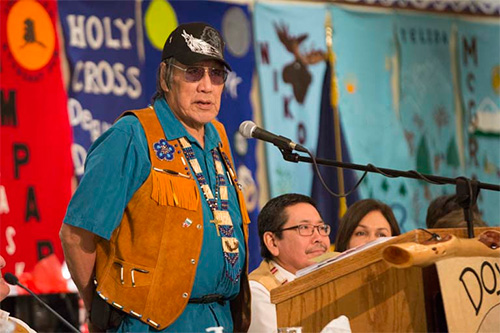
Gilbert shares indigenous knowledge, wisdomBy LEONA LONG
April 16, 2016
“All people, non-Native people and Alaska Natives, they are all my people,” says Gilbert, an Episcopal priest. “I talk to them everywhere I go. Because the love I have, I want to help whoever wants help. I want everyone to be one people. In my heart, I love all the people in Alaska.”
Trimble Gilbert, an Episcopal priest and tribal leader, will be awarded an honorary doctorate by the University of Alaska Fairbanks in May.
This May, the University of Alaska Fairbanks will recognize Gilbert’s lasting contributions to students and Alaska with an honorary Doctor of Laws degree. At UAF, he serves as an elder and mentor in intensive university courses through the College of Rural and Community Development education and indigenous programs, where his traditional wisdom bridges Western knowledge taught in the classroom with everyday life in rural communities. “Trimble reflects the values, knowledge, and wisdom of Gwich’in people in the way he lives his life,” says Evon Peter, UAF vice chancellor of rural, community and Native education and a former chief of Vashraii K’oo. “He is widely recognized as an accomplished scholar of indigenous knowledge, philosophy, skills and cultural practices. Just as important, he graciously shares his knowledge, love and support with the broader Alaska community that surrounds him. Trimble is absolutely deserving of this credential and level of acknowledgement.” As an elder in UAF classrooms, Gilbert emphasizes the importance of education when he speaks to students. He never attended school — instead he watched and listened to elders who taught from life experience. Gilbert taught himself to write by copying the words from food commodities like sugar and flour bags. “I never quit learning,” Gilbert says. “I learned because people needed it. Now I encourage young people to earn their degrees and help make Alaska and our world better for everyone. I want young people to learn the new technologies that are taking over in our world so that they can help our people and learn how to take care of themselves and others.” Born in 1935 in Vashraii K’oo, Gilbert grew up at the edge of what is now the Arctic National Wildlife Refuge. He learned the traditional ways of his ancestors. He watched and listened to his elders to learn how to tan caribou skin and fish, trap and hunt for food. For centuries, the Gwich’in people followed the moose and caribou. Gilbert recalls that during times of starvation, anyone strong enough, including women and children, would pull sleds within a 100-mile radius of Arctic Village looking for food. He has trapped hundreds of wolves and wolverines, using their thick fur to make parkas, mittens, hats and other clothing to survive brutal Arctic temperatures. He and his wife, Mary, are also accomplished skin sewers. Now in his 80s, Gilbert maintains a strong vitality. Every Sunday he reads the Gospels from the Bible in the Gwich’in language. Gilbert is one of a handful of remaining speakers of Dinjii Zhuh Ginjik, the Gwich’in language. The accomplished fiddler performs at jig dances until the wee hours of the morning, tapping his feet in time with the music as the audience dances. He taught himself how to play the fiddle in the late 1940s. Although he took some time off occasionally to raise and provide for his sons Gregory, Bobby and Albert, Gilbert was performing in his brother’s band by the late 1950s. The Gilbert family is renowned for their musical talent and have toured and performed in Canada, Washington state, Washington, D.C., and throughout Alaska. Gilbert still plays the fiddle at celebrations and to entertain guests. His sons and several of his grandchildren are accomplished musicians and perform with Gilbert in Vashraii K’oo for holiday celebrations and at the church. He also volunteers his time teaching younger generations how to play music with the Dancing with the Spirit music group. “I can’t read music,” says Gilbert, whose father and grandfather were square-dance callers. “I taught myself how to play the fiddle by listening to a Canadian station on a transistor radio. I love to see my family and the young people dance.”
Representations of fact and opinions in comments posted below are solely those of the individual posters and do not represent the opinions of Sitnews.
|
||
